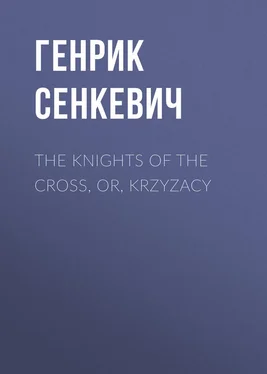Генрик Сенкевич - The Knights of the Cross, or, Krzyzacy
Здесь есть возможность читать онлайн «Генрик Сенкевич - The Knights of the Cross, or, Krzyzacy» — ознакомительный отрывок электронной книги совершенно бесплатно, а после прочтения отрывка купить полную версию. В некоторых случаях можно слушать аудио, скачать через торрент в формате fb2 и присутствует краткое содержание. Жанр: foreign_antique, foreign_prose, на английском языке. Описание произведения, (предисловие) а так же отзывы посетителей доступны на портале библиотеки ЛибКат.
- Название:The Knights of the Cross, or, Krzyzacy
- Автор:
- Жанр:
- Год:неизвестен
- ISBN:нет данных
- Рейтинг книги:4 / 5. Голосов: 1
-
Избранное:Добавить в избранное
- Отзывы:
-
Ваша оценка:
- 80
- 1
- 2
- 3
- 4
- 5
The Knights of the Cross, or, Krzyzacy: краткое содержание, описание и аннотация
Предлагаем к чтению аннотацию, описание, краткое содержание или предисловие (зависит от того, что написал сам автор книги «The Knights of the Cross, or, Krzyzacy»). Если вы не нашли необходимую информацию о книге — напишите в комментариях, мы постараемся отыскать её.
The Knights of the Cross, or, Krzyzacy — читать онлайн ознакомительный отрывок
Ниже представлен текст книги, разбитый по страницам. Система сохранения места последней прочитанной страницы, позволяет с удобством читать онлайн бесплатно книгу «The Knights of the Cross, or, Krzyzacy», без необходимости каждый раз заново искать на чём Вы остановились. Поставьте закладку, и сможете в любой момент перейти на страницу, на которой закончили чтение.
Интервал:
Закладка:
Jurand sat for awhile with his head between his hands; but finally he awakened as from a dream, and said with sadness and grief:
"I like you, young man, but I cannot give her to you; she is not destined for you, my poor boy."
Zbyszko hearing this, grew dumb and began to look at Jurand with wondering eyes.
But Danusia came to his help. Zbyszko was dear to her, and she was pleased to be considered not "a bush" but "a grown-up girl." She also liked the betrothal and the dainties which the knight used to bring her every day; therefore when she understood that she was likely to lose all this, she slipped down from the arm chair and having put her head on her father's lap, she began to cry:
" Tatulu, Tatulu! "[64] He evidently loved her better than anything else, for he put his hand softly on her head, while from his face disappeared all trace of deadly grudge and anger; only sadness remained.
In the meantime Zbyszko recovered his composure, and now said:
"How is it? Do you wish to oppose God's will?"
To this Jurand replied:
"If it be God's will, then you will get her; but I cannot give you my consent. Bah! I would be glad to do it, but I cannot."
Having said this, he arose, took Danusia in his arms, and went toward the door. When Zbyszko tried to detain him, he stopped for a moment and said:
"I will not be angry with you if you render her knightly services; but do not ask me any questions, because I cannot tell you anything."
And he went out.
CHAPTER III
The next day Jurand did not avoid Zbyszko at all; and he did not prevent him from performing for Danusia, during the journey, those different services which, being her knight, he was obliged to render her. On the contrary, Zbyszko noticed that the gloomy Pan of Spychow looked at him kindly, as if he were regretting that he had been obliged to refuse his request. The young wlodyka tried several times to have some conversation with him. After they started from Krakow, there were plenty of opportunities during the journey, because both accompanied the princess on horseback; but as soon as Zbyszko endeavored to learn something about the secret difficulties separating him from Danusia, the conversation was suddenly ended.
Jurand's face became gloomy, and he looked at Zbyszko uneasily as if he were afraid he would betray himself.
Zbyszko thought that perhaps the princess knew what the obstacle was; so having an opportunity to speak to her privately, he inquired; but she could not tell him anything.
"Certainly there is some secret," she said. "Jurand himself told me that; but he begged me not to question him further, because he not only did not wish to tell what it was, but he could not. Surely he must be bound by some oath, as so often happens among the knights. But God will help us and everything will turn out well."
"Without Danusia I will be as unhappy as a chained dog or a bear in a ditch," answered Zbyszko. "There will be neither joy nor pleasure, nothing but sorrow and sighing; I will go against the Tartars with Prince Witold and may they kill me there. But first I must accompany uncle to Bogdaniec, and then tear from German heads the peacock's tufts as I promised. Perhaps the Germans will kill me; and I prefer such a death rather than to live and see some one else take Danusia."
The princess looked at him with her kind blue eyes, and asked him, with a certain degree of astonishment:
"Then you would permit it?"
"I? As long I have breath in my nostrils, it will not happen, unless my hand be paralyzed, and I be unable to hold my axe!"
"Then you see!"
"Bah! But how can I take her against her father's will?"
To this the princess said, as to herself:
"Does it not happen that way sometimes?"
Then to Zbyszko:
"God's will is stronger than a father's will. What did Jurand say to you?
He said to me 'If it be God's will, then he will get her.'"
"He said the same to me!" exclaimed Zbyszko.
"Do you not see?"
"It is my only consolation, gracious lady."
"I will help you, and you can be sure of Danusia's constancy. Only yesterday I said to her: 'Danusia, will you always love Zbyszko?' And she answered: 'I will be Zbyszko's and no one else's.' She is still a green berry, but when she promises anything, she keeps her word, because she is the daughter of a knight. Her mother was like her."
"Thank God!" said Zbyszko.
"Only remember to be faithful to her also; man is inconstant; he promises to love one faithfully, and afterward he promises another."
"May Lord Jesus punish me if I prove such!" exclaimed Zbyszko energetically.
"Well, remember then. And after you have conveyed your uncle to Bogdaniec, come to our court; there will be some opportunity then for you to win your spurs; then we will see what can be done. In the meanwhile Danusia will mature, and she will feel God's will; although she loves you very much even now, it is not the same love a woman feels. Perhaps Jurand will give his consent, because I see he likes you. You can go to Spychow and from there can go with Jurand against the Germans; it may happen that you will render him some great service and thus gain his affection."
"Gracious princess, I have thought the same; but with your sanction it will be easier."
This conversation cheered Zbyszko. Meanwhile at the first baiting place, old Macko became worse, and it was necessary to remain until he became better. The good princess, Anna Danuta, left him all the medicine she had with her; but she was obliged to continue her journey; therefore both wlodykas of Bogdaniec bid those belonging to the Mazovian court farewell. Zbyszko prostrated himself at the princess' feet, then at Danusia's; he promised her once more to be faithful and to meet her soon at Ciechanow or at Warszawa; finally he seized her in his strong arms, and having lifted her, he repeated with a voice full of emotion:
"Remember me, my sweetest flower! Remember me, my little golden fish!"
Danusia embraced him as though he were a beloved brother, put her little cheek to his face and wept copiously.
"I do not want to go to Ciechanow without Zbyszko; I do not want to go to Ciechanow!"
Jurand saw her grief, but he was not angry. On the contrary, he bid the young man good-bye kindly; and after he had mounted, he turned toward him once more, and said:
"God be with you; do not bear ill will toward me."
"How can I feel ill will toward you; you are Danusia's father!" answered Zbyszko cordially; then he bent to his stirrup, and the old man shook hands with him, and said:
"May God help you in everything! Understand?"
Then he rode away. But Zbyszko understood that in his last words, he wished him success; and when he went back to the wagon on which Macko was lying, he said:
"Do you know I believe he is willing; but something hinders him from giving his consent. You were in Spychow and you have good common sense, try to guess what it is."
But Macko was too ill. The fever increased so much toward evening, that he became delirious. Therefore instead of answering Zbyszko, he looked at him as if he were astonished; then he asked:
"Why do they ring the bells?"
Zbyszko was frightened. He feared that if the sick man heard the sound of bells, it was a sign that death would soon come. He feared also that the old man might die without a priest and without confession, and therefore go, if not to hell, then at least for long centuries to purgatory; therefore he determined to resume their journey, in order to reach, as soon as possible, some parish in which Macko could receive the last sacraments.
Consequently they started and traveled during the night. Zbyszko sat in the wagon on the hay, beside the sick man and watched him till day-break. From time to time he gave him wine to drink. Macko drank it eagerly, because it relieved him greatly. After the second quart he recovered from his delirium; and after the third, he fell asleep; he slept so well that Zbyszko bent toward him from time to time, to ascertain if he was still alive.
Читать дальшеИнтервал:
Закладка:
Похожие книги на «The Knights of the Cross, or, Krzyzacy»
Представляем Вашему вниманию похожие книги на «The Knights of the Cross, or, Krzyzacy» списком для выбора. Мы отобрали схожую по названию и смыслу литературу в надежде предоставить читателям больше вариантов отыскать новые, интересные, ещё непрочитанные произведения.
Обсуждение, отзывы о книге «The Knights of the Cross, or, Krzyzacy» и просто собственные мнения читателей. Оставьте ваши комментарии, напишите, что Вы думаете о произведении, его смысле или главных героях. Укажите что конкретно понравилось, а что нет, и почему Вы так считаете.












